Ashok Leyland drives digitisation and cost control
- By Bhushan Mhapralkar
- October 08, 2021

Recording a 353 percent increase in the revenue for the first quarter of FY2021-22 at INR 29,510 million in comparison to the revenue generation of INR 6,510 million in the corresponding quarter of FY2020-21, Ashok Leyland is confident of a strong demand emerging post the second Covid-19 wave. Clocking export volumes of 1,437 units in the first quarter of FY2021-22, up 254 percent when compared to the export of 405 units in the first quarter of FY2020-21, the commercial vehicle manufacturer is concentrating on vaccination and the adherence of safety protocols to try and ensure that all its stakeholders stay protected from a potential third wave. Experiencing a 1,041 percent growth in domestic M&HCV volume in the first quarter of FY2021-22, which is almost twice than that of the industry growth volume at 562 percent during the same period, the company has reported a net loss of INR 28,20 million in the first quarter of FY2021-22 as against a net loss of INR 38.90 million in the corresponding quarter of FY2020-21. Selling 8,690 LCVs in the domestic market in the first quarter of FY2021-22, up 224 percent as compared to the sale of 2,686 LCVs in the corresponding quarter last fiscal, Ashok Leyland is closely observing the way the freight rates are shaping up. It is confident that freight rates will improve with higher availability of commercial vehicles once the Covid-19 subsidies and uncertainty fades. “We are hoping for the volumes to grow higher as the market gets better,” mentioned Mahadevan. “July (2021) has been a growth month,” he added. Stressing that they have had eight months of degrowth, Mahadevan said, “Economic growth will induce growth in CVs.”

CV trends
Working on a strategy for a robust domestic and exports growth, the commercial vehicle major is appointing dealers in Africa. Looking at gaining good traction in South East Asia, Ashok Leyland will launch new products in the LCV segment even though not in the immediate quarter. Buoyed by the international markets opening up and experiencing export thrust, the company is said to be testing an electric version of its LCV platform on which the Bada Dost is based in the UK. This vehicle is expected to be launched at the end of this fiscal or in the first half of the next fiscal. Of the opinion that electric vehicles are catching up, especially at the local point of use, on the encouragement of the governments, Mahadevan averred, “It is more to do with buses, but trucks will catch up.” Seeing a trend of petrol commercial vehicles in the low-tonnage segment of sub-1 tonne to 1.5 tonne, Mahadevan drew attention to the push on CNG. “We are ready in the LCV and ICV (segment),” he added. Of the firm belief that diesel vehicles will continue and the IC engine will coexist and not die overnight, Mahadevan said, “We are ready to cater to higher demand.”

Watching closely how freight operators are able to pass on the fuel price hike to their end customers, Ashok Leyland is hoping that bus commute will pick up. A 40,000 units per annum market, according to Mahadevan, buses have been severely affected due to the Covid-19-led disruption. Delivering 40 electric buses to the city of Chandigarh recently (from where it has bagged an order to build and maintain e-buses with quick charging technology), Ashok Leyland is expecting pent-up demand to show up once normalcy returns. Also expecting demand to show up because of the need to ferry people without sacrificing social distancing norms, Mahadevan drew attention to their work towards further strengthening their position in the bus and LCV market segments. With the talk of schools reopening in regions where the Covid-19 infections are down, and the relaxation in Covid-19 norms in some region allowing more employees to return to their offices, bus demand is expected to improve post witnessing a sudden downfall mid-last year. Through the establishment of Switch Mobility, Ashok Leyland is keen to experience a speedier ride in the ‘cleaner and greener’ bus space.
Managing costs and productivity
Eyeing international markets like the US, Europe and Japan, the company, through the Switch Mobility subsidiary, has worked with a few consultants to make sure that its data points and numbers are on par with the current situation. Under Switch Mobility, it is developing new products to present an advantage of unique position in terms of value and premium positioning. For its Switch Mobility subsidiary that includes the erstwhile Optare of UK, Ashok Leyland has managed to get USD 18 million worth of investment from Dana Incorporated (Dana), a US-based manufacturer of drivetrain and e-propulsion systems. To do de-bottlenecking once enough demand is evident, Ashok Leyland, investing sufficiently in terms of capex, is confident of seeing early growth sprouts in LCVs. Therefore, if it were to do immediate capex investment, it would be in LCVs. Discussing with scrappage centres post the announcement of the scrappage policy, Ashok Leyland, the second-largest CV maker in the country, is witnessing good traction from its other business verticals like defence, power solutions and aftermarket. They are contributing to its top line.

With the pace of vaccination picking up and positively setting in, Ashok Leyland is expecting a demand spike in commercial vehicles after the fear of a third Covid-19 wave is over. This, according to Mahadevan, could happen in the second half of this fiscal. Focusing on costs, productivity and middle level management, the commercial vehicle major is also concentrating on reducing its carbon footprint. Apart from announcing strategic steps to move towards net zero carbon mobility through Switch Mobility, Ashok Leyland, said Mahadevan, has formed an ESG committee of the Board. The committee will guide and propel the commercial vehicle manufacturer to achieve its sustainability agenda.
As the world’s largest supplier of defence logistics vehicles, fourth-largest manufacturer of buses and the tenth-largest manufacturer of trucks globally, Ashok Leyland is driving AI-led digital transformation for strong business growth. Establishing a separate group focusing on business analytics called the Analytics Centre of Excellence, the company has invested in a data science team. It has also roped in employees from the business side to help with the information and data. Together, they have been given the responsibility to identify business function challenges being faced and how AI-enabled analytics can help resolve them. Starting roughly a decade ago and applying more thrust since 2016, the digitisation journey of Ashok Leyland has had an influence on efficiency enhancement and business optimisation. It has helped it to generate new revenue stream and build new business models. Rather than simply account for the initial acquisition price of its products, Ashok Leyland, as part of its digitisation strategy, is now participating in the lifecycle costs of its products in terms of spares, service and other value-added offerings. These lifecycle costs predominantly include those that the commercial operator or fleet incurs after he or she has bought the commercial vehicle, and until the end-of-life.
- IAC India
- Lumax Group
- IAC Group
- Mahindra
- VECV
- Maruti Suzuki India
- Skoda
- Volkswagen
- Stellantis
- Sunil Koparkar
IAC India Bets On Engineering Depth & Diversification, Targets 20% CAGR Growth Till FY2030
- By Nilesh Wadhwa
- February 28, 2026

Sunil Koparkar, Managing Director, IAC India, outlines the company’s strategy to reduce customer concentration, expand exports and leverage group synergies following its integration with the Lumax Group.
As India’s automotive interior market evolves towards premiumisation, localisation and faster product cycles, IAC India, part of the Lumax Group, is repositioning itself beyond a single-customer dependency model – without diluting its core partnerships.
IAC India continues to derive a significant share of its revenue from Mahindra’s passenger vehicle business. While the concentration remains high, Koparkar is clear that diversification will be driven through growth rather than dilution.
“Mahindra will always be our primary customer. We have a very strong strategic partnership. But we are also working on expanding with other OEMs and in the commercial vehicle space. Our goal remains a 20 percent CAGR,” he says.
For FY2025, IAC India USD 140 million in revenue, and is targeting a 20 percent growth in FY2026. The company counts Mahindra as its primary customer with almost 78 percent of its business coming from them, while Maruti Suzuki India (12%), Volvo Eicher Commercial Vehicles (5%), Skoda-Volkswagen (3%) and Stellantis (1%) contribute towards the remaining business.
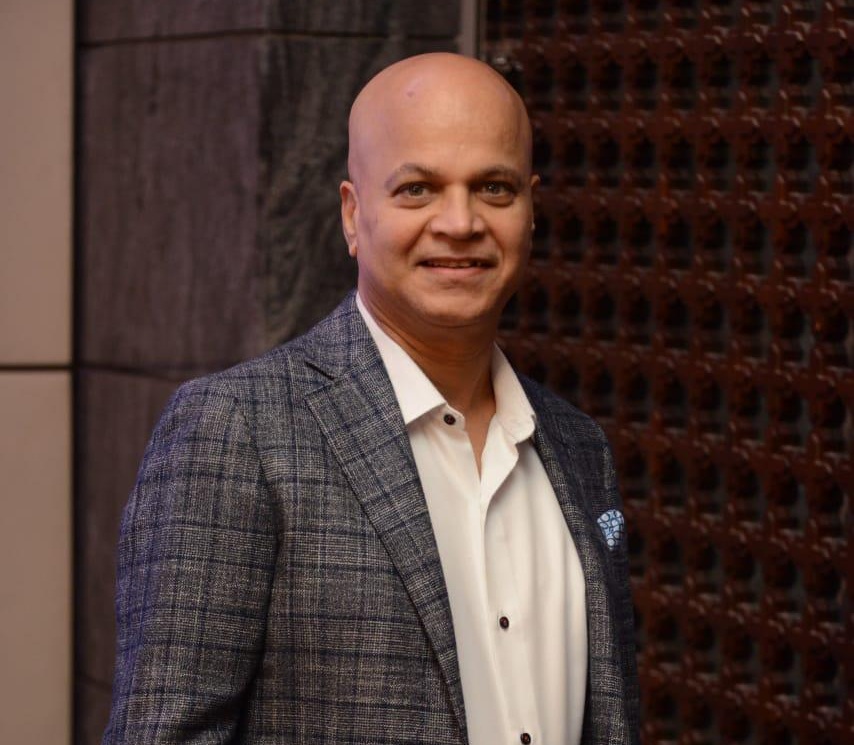 What’s more, responding to the company’s expansion plans, Koparkar revealed, that IAC Group, in addition to introducing new products, is also in talks with new-age players who have just entered Indian market (and also planning too) for supplying products.
What’s more, responding to the company’s expansion plans, Koparkar revealed, that IAC Group, in addition to introducing new products, is also in talks with new-age players who have just entered Indian market (and also planning too) for supplying products.
Currently, passenger vehicles account for roughly 90 percent of the business, with commercial vehicles forming the balance. Value-wise, Koparkar expects CV contribution to rise, even if percentage splits remain broadly similar due to the rapid growth of PV volumes.
Responding to a query on the potential growth from the CV segment, Koparkar said, “There is clear potential in CV interiors. As the CV market moves towards more comfortable cabins — with features like airbags, HVAC and infotainment — the opportunity for interior suppliers increases. Through Volvo Eicher, we have already helped drive that trend in India.”
When asked about the company’s expansion plans, Koparkar also stated that IAC Group is open to expanding to new regions as it aims to operate closer to its customers. One of the potential new projects for the company could very well be Chennai, as the company is in early talks with a new CV customer as well as VinFast.
Engineering as a Standalone Growth Lever
A key pillar of IAC India’s strategy is its expanding engineering capability. The company has been scaling up its R&D and product development team and increasingly positioning engineering services as a distinct revenue stream.
The company at present, employs over 300 engineers in India, which it aims to scale it upto 400-plus by next year and 500-plus in the coming few years.
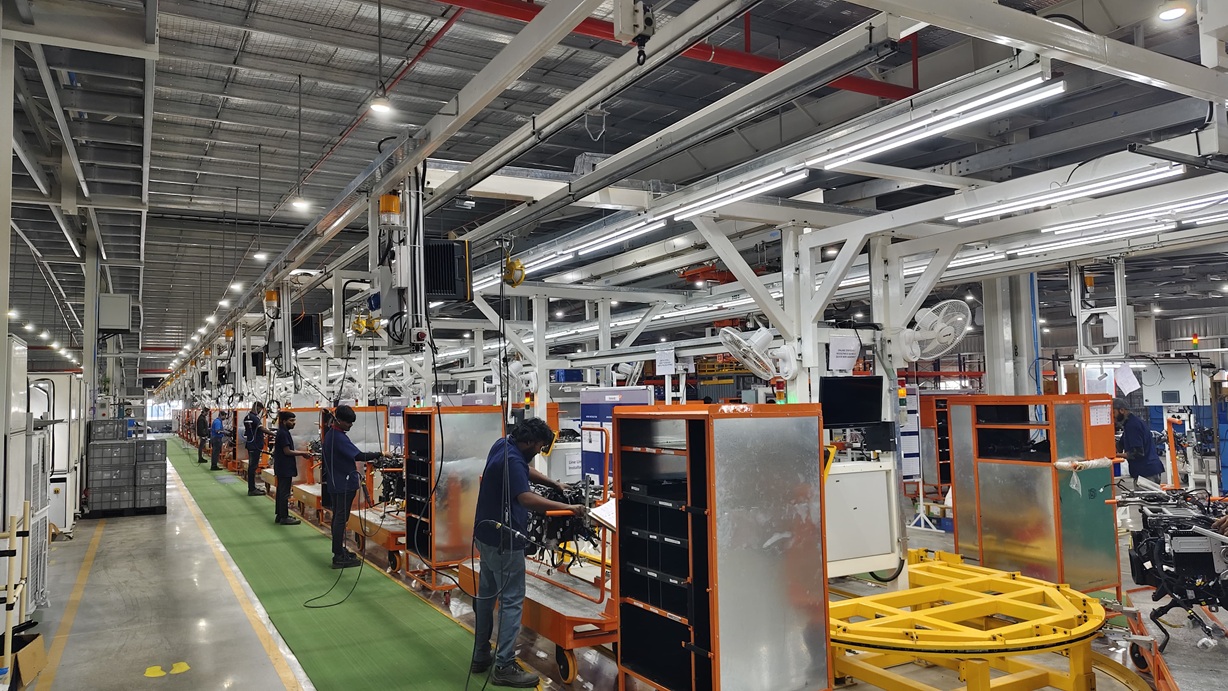
Historically, the Indian Engineering Centre supported the global IAC Group. “We were primarily the IAC Group engineering development centre. We will continue to provide those services. But now, besides global support, we are also offering engineering services to local OEMs,” Koparkar explains.
These services span studio collaboration, basic product design, CAE analysis and prototype development. In some cases, this can potentially evolve into full-scale supply programmes.
Importantly, innovation is now being formalised locally. “This year alone, we are in the process of filing about 30 patents,” he says. Earlier, intellectual property was subsumed under the global entity; now, filings are being initiated in India.
R&D investment remains aligned with group benchmarks at around 1.5–2 percent of revenue.
Exports: Measured Ambition
In terms of export potential, it currently contributes less than 5 percent towards the revenue, primarily through smaller kinematic parts. Direct exposure to the US market is negligible.
“Tariff-related uncertainty does not affect us because we do not export to the US,” Koparkar says. “Logistically, it does not make sense to ship our large interior parts there.”
Europe remains the primary export target. “The opportunity lies in leveraging our design capabilities and local development strengths. If logistics can be managed efficiently, there is room to grow.”
He also sees the Lumax Group’s aftermarket division as a future vehicle for export expansion.
Localisation and Supply Chain Resilience
On the localisation front, IAC India has made significant progress. “Last year was the first time we were able to localise over 99 percent of our tooling and development in India,” Koparkar states. Machinery on shop floors is largely localised, with only certain raw materials still imported.
The semiconductor crisis, he adds, had minimal direct impact. “We do not source electronics for our products — that is handled by the customer. However, from a development perspective, we are evaluating secondary substitutes for imported components, so we are prepared in case of disruptions.”
Premiumisation, Sustainability and AI
Premiumisation is currently the dominant interior trend. “Customers are moving away from basic plastics to more premium-feel interiors. Electronification is a big driver,” Koparkar says.
Sustainability, however, remains nascent in India. “There is no specific push for sustainable materials yet. What OEMs are looking for is lightweighting to meet upcoming CAFE norms. If a sustainable material delivers significant weight reduction, then it becomes serious.”
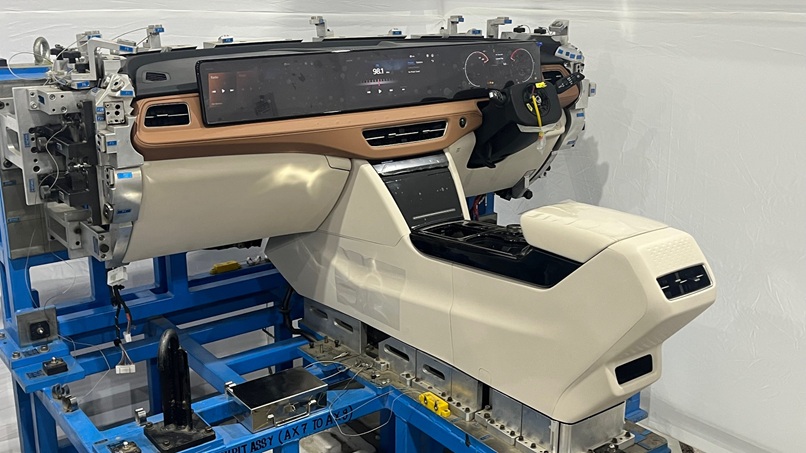
He points to jute, coir and bamboo fibres as potential alternatives but stresses that ecosystem-level collaboration is essential. “Unless a circular economy develops around us, sustainable materials will struggle to scale.”
On automation, operations across IAC’s six plants are roughly a 50:50 mix of automated and manual processes, depending on volume justification. Cobots and semi-automation are used where full automation does not offer viable returns.
AI, meanwhile, is expected to influence design more than manufacturing. “We see AI helping us accumulate design learnings and reduce design cycle times. Its impact will be more visible in engineering services than on the shop floor.”
Faster Development Cycles
Product life cycles are shrinking rapidly. “It used to take five years to develop a car,” Koparkar reflects. “With the XUV700, we worked with the customer to shrink that to 42 months. EVs are being developed even faster.”
As development timelines compress and interiors become more technology-intensive, IAC India is betting on engineering depth, localisation strength and group synergies to sustain its 20 percent growth ambition – while steadily broadening its customer and geographic footprint
- Rosmerta Technologies
- The Curious Bunch
- CII National Conclave on Road Safety
- Dr Rajesh Mohan
- Ravi Krishnamoorthi
- road safety
Rosmerta Launches Road Safety Comic Book For Schools
- By MT Bureau
- February 27, 2026
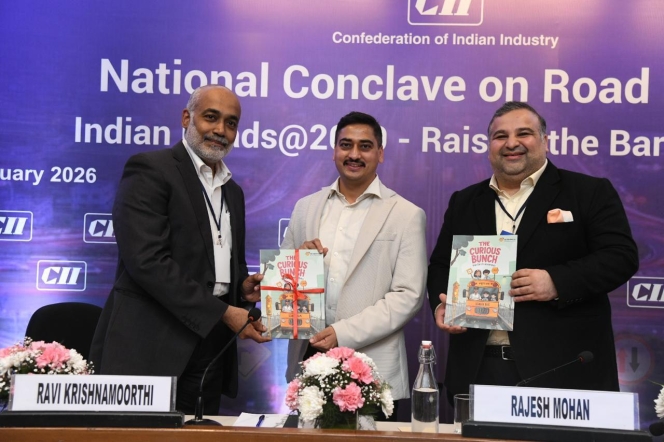
Rosmerta Technologies has launched a comic book titled ‘The Curious Bunch’ at the 3rd Edition of the CII National Conclave on Road Safety. The publication is designed to introduce road safety awareness to children.
The initiative aligns with the Government of India’s ‘4E’ strategy for road safety, which focuses on Engineering, Education, Enforcement and Emergency Care. The comic book aims to address the 168,000 road fatalities reported in India in 2022 by fostering safe habits at a school level.
The comic book uses illustrations to present road scenarios, including pedestrian conduct, school bus safety, traffic signals & the use of helmets, seatbelts and child restraint systems. By educating children, the company intends to influence the behaviour of parents and the wider community.
Rosmerta, a provider of mobility solutions, currently operates technology systems for automated driving tests and AI-based monitoring. The launch of ‘The Curious Bunch’ marks an expansion of its activities into the education pillar of the national safety framework.
Dr Rajesh Mohan, DCP, Gurugram Traffic, said, “When we educate children and instil strong moral and ethical values, the impact travels far beyond the classroom. Children naturally share what they learn. They question, they explain, and they influence conversations at home. In many ways, they become powerful advocates, encouraging their parents to be more aware, more responsible, and more engaged. Over time, this awareness translates into action, because parents are also drivers, commuters, and decision-makers on the road.”
Ravi Krishnamoorthi, Group President, Rosmerta Technologies, said, “Every road accident statistic hides a parent’s anxiety. In 2022 alone, India reported over 168,000 road accident fatalities, according to government data. Road safety is not merely about compliance; it is about compassion and collective responsibility. When a child understands why a red light matters or why a helmet can save a life, they don’t just learn a rule - they become ambassadors of safety within their families and communities. Through ‘The Curious Bunch’, we aim to nurture this awareness early, because the habits we shape in children today will define the safety culture of our nation tomorrow.”
- Maruti Suzuki India
- Transport Department of Tamil Nadu
- Automated Driving Test Tracks
- ADTT
- M K Stalin
- RTO
- CMVR
- Rahul Bharti
Maruti Suzuki Commissions Seven Automated Driving Test Tracks In Tamil Nadu
- By MT Bureau
- February 27, 2026
Maruti Suzuki India, in partnership with the Transport Department of Tamil Nadu, has announced the commissioning of seven Automated Driving Test Tracks (ADTTs) in the state. The facilities were inaugurated by the Chief Minister of Tamil Nadu, M K Stalin.
The tracks are located at Regional Transport Offices (RTOs) in Coimbatore (Central), Tiruvannamalai, Krishnagiri, Madurai (North), Sivagangai, Dindigul, and Tiruchirappalli (West). These sites form part of a Memorandum of Agreement to automate ten tracks across the state, with the remaining three at Tirunelveli, Tuticorin and Marthandam scheduled for operation shortly.
The ADTTs are designed to evaluate applicants for two-wheeler and Light Motor Vehicle (LMV) licences. The system removes human intervention from the evaluation process to ensure objective testing according to the Central Motor Vehicle Rules (CMVR).
Key technical components include:
- Video Analytics: High-definition cameras to monitor vehicle movement and path adherence.
- Sensors: Radio Frequency Identification (RFID) and Harnessing AutoMobiles for Safety (HAMS) technology.
- Identification: Face-recognition systems to verify candidate identity.
- Results: Integrated IT systems that generate test results automatically based on real-time data.
The carmaker has commissioned 56 ADTTs across eight states, including Uttar Pradesh, Delhi, and Bihar. Following the completion of agreements with Rajasthan and Andhra Pradesh, the company’s footprint is expected to reach 81 tracks nationwide.
Rahul Bharti, Senior Executive Officer, Corporate Affairs, Maruti Suzuki India, said, “As part of Maruti Suzuki’s road safety initiatives implemented across multiple states, we are partnering with the Government of Tamil Nadu to strengthen the driver licensing evaluation process through the deployment of 10 Automated Driving Test Tracks (ADTTs). Equipped with high-definition cameras and advanced analytics, these ADTTs enable a comprehensive, efficient, and transparent assessment process. It eliminates any human bias and ensures that only skilled drivers are awarded a license.”
“According to data shared by the Ministry of Road Transport & Highways, India witnessed 1.77 lakh road accident deaths in 2024. Promoting disciplined driving practices and ensuring rigorous driver evaluation are vital to prevent road accidents and augment road safety across the country,” he said.
BYD To sponsor BVRLA Annual Dinner 2026
- By MT Bureau
- February 26, 2026
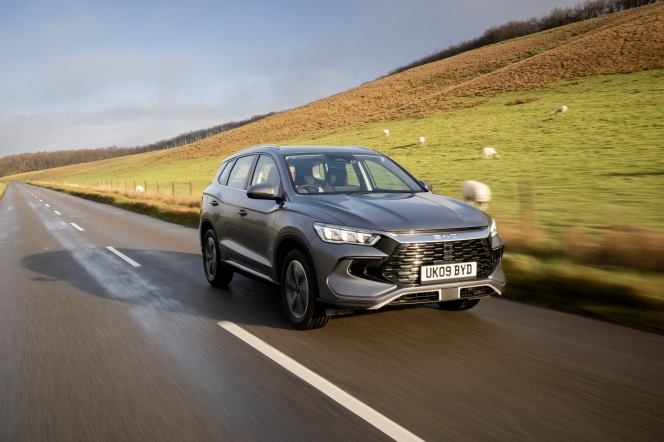
BYD, the world’s leading manufacturer of New Energy Vehicles, will once again serve as the headline sponsor for the British Vehicle Rental and Leasing Association (BVRLA) Annual Dinner in 2026. This marks the third consecutive year the company has supported the prestigious event, which is set to take place on 4 March 2026 at the JW Marriott Grosvenor House Hotel on Park Lane, London. The dinner is widely recognised as the premier gathering for professionals across the rental, fleet management and leasing sectors.
Through its ongoing sponsorship since 2024, BYD reaffirms its commitment to this vital segment of the UK automotive market. The company’s expanding presence was underscored in 2025 by the introduction of several new models, including the SEALION 7, DOLPHIN SURF, SEAL 6 Saloon and Touring and the ATTO 2. These launches contributed to significant sales figures, with 21,824 units delivered to fleet customers and 5,964 to the rental sector. The momentum has continued into 2026 with the debut of the SEALION 5 DM-i, while the ATTO 2 DM-i and ATTO 3 EVO are expected to arrive shortly. Supporting this growth is a dedicated UK fleet team of 11 specialists, offering tailored product and service expertise.
The BVRLA represents around 1,000 member organisations, ranging from SMEs to large public companies, all operating within or alongside the UK’s vehicle rental and leasing industries. By engaging with government and upholding professional standards, the association enables its members to provide safe, sustainable and accessible transport solutions. This year’s Annual Dinner will feature the presentation of the Industry Hero Awards and live entertainment from award-winning comedian Tom Ward, celebrating excellence across the sector.






Comments (0)
ADD COMMENT